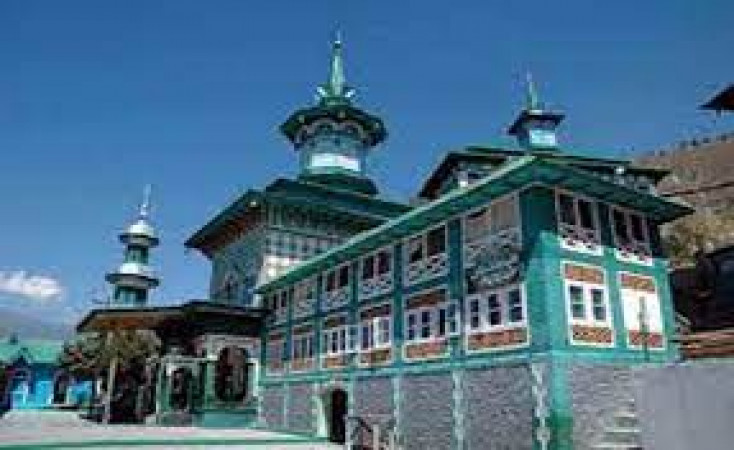
Aishmuqam Shrine
Duration
1 to 1 Days
1 to 1 Days
Best time to visit
Jun-Aug
Jun-Aug
Theme
Religious
Religious
Aishmuqam Shrine Travel Guide
Aishmuqam Shrine is a historical and culturally significant destination located in Anantnag district of Jammu and Kashmir, India. Known for its spiritual importance, this shrine is dedicated to the Sufi saint Baba Zain-ud-Din Wali. The shrine attracts pilgrims and tourists alike, seeking blessings and exploring the rich heritage of the region.Top Attractions in Aishmuqam Shrine
- Aishmuqam Shrine itself
- Martand Sun Temple ruins
- Achabal Gardens
- Anantnag town
Aishmuqam Shrine is Famous for
Spiritual significance and historical heritage.Top Attractions in Aishmuqam Shrine
- Explore the Aishmuqam Shrine
- Visit the ancient ruins of Martand Sun Temple
- Relax in the beautiful Achabal Gardens
- Discover the charm of Anantnag town
What's Great about Travelling to Aishmuqam Shrine?
- Experience spiritual tranquility
- Explore rich cultural heritage
- Enjoy scenic beauty of the region
What's Not So Great about Travelling to Aishmuqam Shrine?
- Limited accommodation options
- Remote location may pose transportation challenges
- Weather fluctuations in the region
Travel Tips for Aishmuqam Shrine
- Respect local customs and traditions
- Carry necessary medications for altitude sickness
- Dress modestly while visiting religious sites
Important Aishmuqam Shrine trip information
- Ideal Duration: 2-3 days
- Best Time to Visit: April to October
- Nearby Airports and Railway Stations: Srinagar Airport, Anantnag Railway Station
FAQ's on Aishmuqam Shrine
Q1: What is the best time to visit Aishmuqam Shrine?
The best time to visit Aishmuqam Shrine is during the spring and autumn months when the weather is pleasant for exploring the shrine and its surroundings. Avoid the peak summer months as it can get quite hot, and winter months may bring snowfall that could hinder travel plans.
Q2: Do I need a visa to travel to Aishmuqam Shrine?
Visa requirements for Aishmuqam Shrine depend on your nationality. Many visitors can obtain a visa on arrival, while others may need to apply for a visa in advance. Check with the embassy or consulate of the country to confirm visa requirements before your trip.
Q3: What are the must-visit attractions in Aishmuqam Shrine?
Aishmuqam Shrine is known for its spiritual significance and stunning natural beauty. Must-visit attractions include the Aishmuqam Shrine itself, Lidder River for scenic views, and nearby Aru Valley for trekking and camping adventures.
Q4: Is Aishmuqam Shrine a safe place to travel?
Aishmuqam Shrine is generally a safe place to travel. However, like any destination, it's advisable to be cautious of your surroundings, avoid isolated areas at night, and take necessary precautions to safeguard your belongings.
Q5: What is the local currency in Aishmuqam Shrine and can I use credit cards?
The local currency in Aishmuqam Shrine is the Indian Rupee. While credit cards are accepted in some hotels and larger establishments, it's advisable to carry cash for smaller purchases. ATMs are available in nearby towns for currency exchange.
Q6: What is the local cuisine like in Aishmuqam Shrine?
offers a taste of traditional Kashmiri cuisine, featuring dishes like Rogan Josh, Yakhni, and Dum Aloo. Vegetarian options like Rajma Chawal and Haak Saag are also popular. Don't miss trying the local bread called 'Kashmiri Roti' and the famous Kashmiri Kahwa tea.
Q7: What transportation options are available in Aishmuqam Shrine?
Transportation options in Aishmuqam Shrine include local buses, taxis, and private car rentals. Additionally, you can explore the area on foot to enjoy the scenic beauty. Hiring a local guide for sightseeing tours is recommended for a hassle-free experience.
Q8: Are there any cultural norms or etiquette I should be aware of when visiting Aishmuqam Shrine?
When visiting Aishmuqam Shrine, it's important to respect local customs and traditions. Dress modestly, especially when visiting religious sites. Greeting locals with a 'Salam' and showing respect for elders are considered polite gestures in the local culture.
Q9: I am a travel agent. How can I buy travel leads of Aishmuqam Shrine?
Register yourself as a travel agent at agents.tripclap.com and then you can buy travel leads to Aishmuqam Shrine once your account is approved. For more details contact our support team at +91-8069186564 or support@tripclap.com
